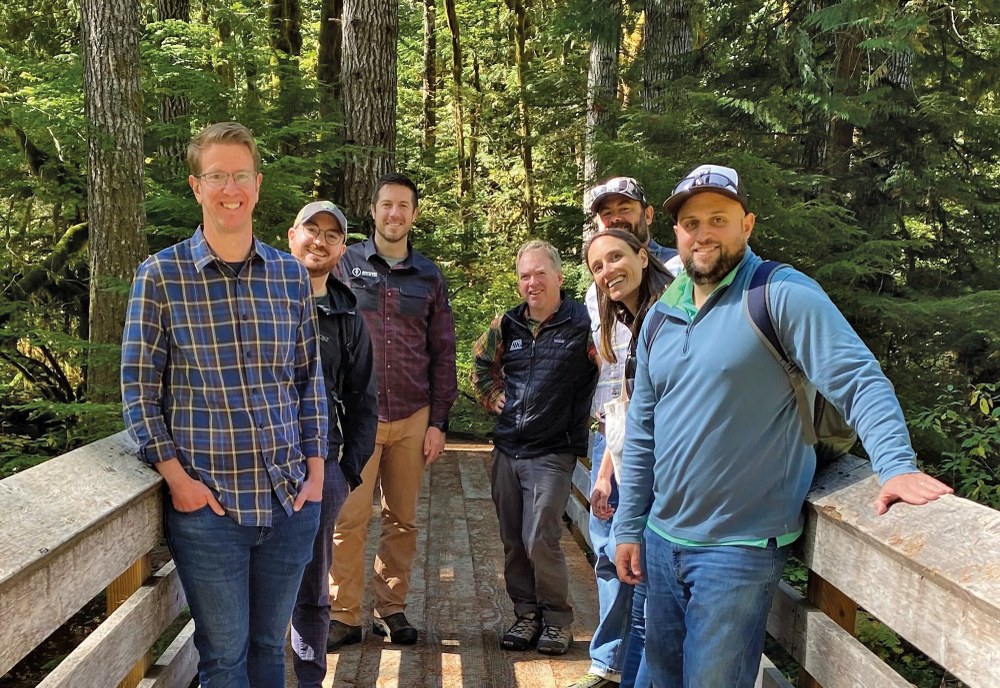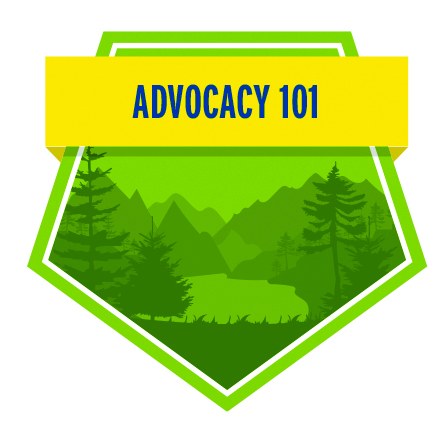
It was a humid summer day in the other Washington, as I donned a sport coat and tie and met with fellow bird conservation advocates on Capitol Hill. As a budding conservation advocate, this was my first in-person lobby meeting – a short 15-minutes with a congressional staffer about a bill that would help make federal buildings safer for birds.
Our group was coordinated by staff from the National Audubon Society, who prepared us for how the meeting would flow and divvied up roles. We were three bird enthusiasts sharing stories to help convince our Representative to co-sponsor this particular bill. We were doing it - we were advocates. These brief interactions between constituents and lawmakers or their staff can make a powerful impact on efforts to move policy at all levels of government.
Through hundreds of lobby meetings and thousands of letters, The Mountaineers has spoken up for public lands and the transformative recreation experiences they provide. Public lands and outdoor recreation face a unique suite of challenges, including impacts from climate change and chronic underfunding of land managers. We need more advocates for the outdoors, but it can be hard for outdoor enthusiasts to know where to start when it comes to advocacy.
In response to a growing desire for Mountaineers advocacy training, we launched Advocacy 101 earlier this year, an eLearning course to help more members go from outdoor enthusiasts to outdoor advocates. This course offers a systematic way to learn the basics of advocacy so that all in our community can speak up for the landscapes that connect us to nature.
Why Advocacy 101?
The term “advocacy” encompasses a broad range of activities– including education, organizing, and lobbying – used to influence public policy. Throughout our 117-year history, The Mountaineers has been a part of every major conservation campaign in Washington state, utilizing various advocacy tactics to help achieve several historic conservation victories. Now more than ever, we need more Mountaineers to adventure with purpose and become stewards and advocates for the lands they love.
Each year, hundreds of Mountaineers take our Low Impact Recreation and Public Lands 101 eLearning courses to grow their stewardship ethic and help build a culture of conservation throughout The Mountaineers. Low Impact Recreation is frequently included as a graduate requirement in our skill-based courses. Public Lands 101 provides a foundational background every advocate should have, but it only scratches the surface of advocacy. Advocacy 101spotlights how to get started as an advocate and introduces best practices for advocating for important conservation and recreation initiatives.
As an Advocacy 101 student, you’ll dive into advocacy by building and sharpening your skills and preparing for future opportunities to advocate through The Mountaineers and beyond. After completing the course, you’ll be ready to continue advocating for an issue or place you care about on your own or with fellow outdoor enthusiasts as part of organized lobby days.
 Take our new eLearning course to earn your Advocacy 101 badge.
Take our new eLearning course to earn your Advocacy 101 badge.
The 10 Essentials of outdoor advocacy
Think of Advocacy 101 as providing the essential items for your outdoor advocacy journey. The course begins by outlining the basics of advocacy: what it is, why it’s important, what advocacy looks like, and how lawmakers and land managers are the main targets of our advocacy.
Next, we explore why it’s valuable to engage with the elected lawmakers that represent you at the state and federal level on the issues you care about. We then unpack best practices for five ways to engage with lawmakers: contacting them directly (letters and calls),engaging with them on social media, attending an event, writing a Letter to the Editor, and participating in a lobby day. While there’s nuance depending on who you’re advocating with, these best practices are transferable from Olympia to Washington DC. Regardless of how you choose to engage, it’s important to weave in a personal story to highlight the significance of the action you’re asking lawmakers to take.
Constituent visits are one of the most effective ways to influence policy. Once you’ve caught your advocacy groove by taking some preliminary advocacy actions, you can take the next step by meeting with your representatives or their staff with other outdoor enthusiasts. Some of our partners, including Washington Trails Association and the Washington Wildlife and Recreation Coalition, typically organize lobby days with Washington state lawmakers. Mountaineers conservation staff and members regularly participate in these events, and we look forward to organizing similar opportunities to raise our voices for public lands and the outdoor experiences they provide.
Advocacy isn’t only about engaging your elected representatives. It’s important for land managers - federal, state, or local government agencies that work to protect natural and cultural resources and manage recreation- to hear from you. Land managers don’t represent you the way your elected officials do, but there are important opportunities to contact them and shape how public lands are managed. Advocacy 101 shares why it’s important to weigh in through public comment during land management planning efforts, how to find these opportunities, and best practices for submitting personalized feedback.
When it comes to advocacy, taking action is the name of the game. While taking the course, you’ll be prompted to take action by crafting a letter to a lawmaker or land management agency. One of the ways Advocacy 101 can serve as a springboard to further advocacy involvement is by utilizing the course survey to create your own outdoor advocacy plan.
Become an advocate
Participating in that first lobby meeting through the Audubon Society was a watershed moment that built my confidence with advocacy, inspired deeper involvement in conservation, and made me feel like I was truly making a difference.
Securing policy wins can be a long game, but advocating is easy. It only takes 5-10minutes to complete a small action that will help build momentum for important policy issues affecting the future of our public lands and climate. Whether you’re a seasoned advocate, a total newbie, or somewhere in between, Advocacy 101 will sharpen your skills regardless of your level of experience.
“I’ve seen how advocacy by outdoor enthusiasts helps achieve landmark wins for our public lands and climate. As we continue to pursue our mission during a time of growing challenges for the outdoors, it’s more important than ever for lawmakers and land managers to hear from Mountaineers,” said CEO Tom Vogl.
As you begin your advocacy journey, we encourage you to first take the Low Impact Recreation and Public Lands 101 courses. In Low Impact Recreation, you will learn how to lessen your impact on the landscape and bolster your knowledge of Leave No Trace principles. Next, Public Lands 101 will help grow your understanding of federal public lands - an important primer before digging in on advocacy. After these courses, you'll be ready to build and flex your advocacy muscles through our new Advocacy 101 course. All these courses can be found on the conservation education page of our website and make great resources to share and integrate into any Mountaineers courses and activities you lead.
Stay tuned for timely opportunities to apply your advocacy skills in our conservation communications. In the meantime, sign up to take Advocacy 101 online at your own pace at mountaineers.org/advocacy101.
This article originally appeared in our spring 2024 issue of Mountaineer magazine. To view the original article in magazine form and read more stories from our publication, visit our magazine archive.
 Conor Marshall
Conor Marshall